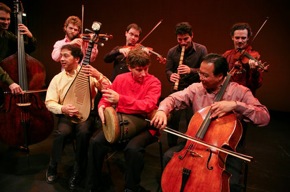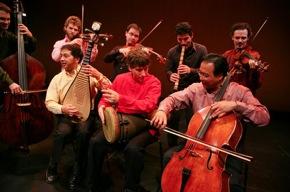It’s always exciting when you can hear the Silk Road Ensemble and its innovative music choices live, and that’s what audiences have in store for them in April. The group, including Yo-Yo Ma, is performing April 6, 7, and 8 in Berkeley, San Francisco, and Davis, respectively. (The April 6 performance is soldout, but the concert on the 7th presented by S.F. Performances still has tickets left.

Featured Video
Related Article
Gabriela Lena Frank: The Well-Grounded Composer
Georgia Rowe profiles the composer and creative advisor to the Berkeley Symphony
Yo-Yo Ma: Ready for the Fire
An interview with celebrated cellist
It’s a fantastic opportunity to hear music from the Ensemble’s newest Grammy-nominated album, Off the Map, as part of its Texas and West Coast tour. True to the defining characteristic of the Silk Road Project, the music draws on musical traditions from around the world. It challenges audiences to look at their definition of “classical” music in an entirely new light.
One of the highlights definitely has a local flavor, though. That would be the brand-new multimovement piece from composer Gabriela Lena Frank, a Berkeley native. With the intriguing title of ¡Chayraq! Rough Guide to a Modern Day Tawantinsuyu, the piece has its origins in the music of the harvest fiestas, religious ceremonies, and festivals of the indigenous people of Latin America, as well as in Frank’s own Peruvian and Chinese heritage.
Other pieces certainly take the audience further afield. Osvaldo Golijov’s Air to Air combines indigenous Mexican prayers with Christian-Arab and Muslim-Arab melodies, along with a protest song from 18th-century Sardinia. You’ll also get a chance to hear compositions by other members of the Ensemble, with everything from percussion and ninth-century Buddhist melodies to new arrangements of the traditional dance music of Galicia ... in other words, a typical Silk Road Ensemble mix.
The performers who compose the ensemble itself may vary for each tour, but the group is always characterized by its sheer exuberance. Generally performing without a conductor, and thus without the standard hierarchy considered normal, this lively and unrestrained group of extremely talented musicians clearly delights in the music it performs. And in the words of Laura Freid, CEO and executive director of the Silk Road Project, “Above all, the musicians have fun, and it shows. They love performing together. They all have their own careers independent of the Silk Road Ensemble, but they make time to come together because it’s a meaningful experience for them — learning and sharing what they’ve learned with each other and with audiences.”
And it’s just that learning and sharing that makes it meaningful for the audiences, as well. They may have a different take on classical music, but it’s something any music lover will find worth experiencing. And who knows? You may discover you have an unexpected fondness for ninth-century Buddhist melodies.

